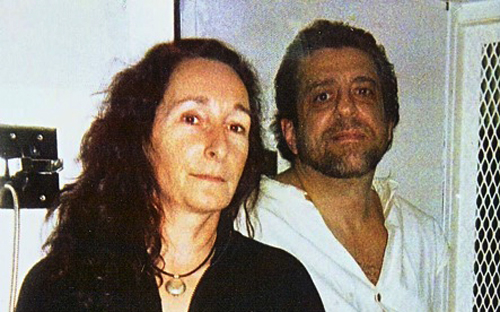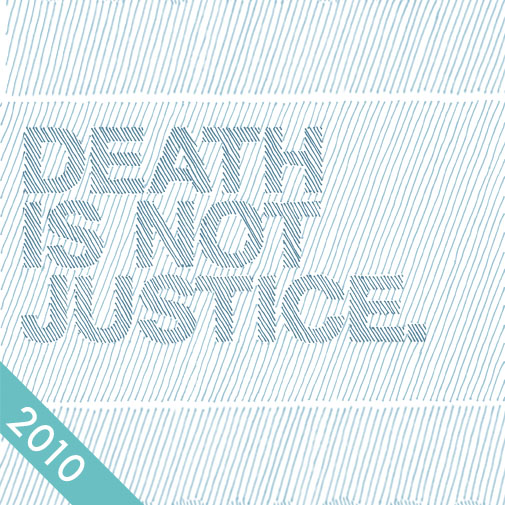Sandrine Ageorges-Skinner is the wife of Hank Skinner, a man who has spent the last fifteen years on Death row trying to prove his innocence.
Hank was convicted of murder on three counts in 1994 and sentenced to death in 1995. However there are numerous unanswered questions and untested evidence to justify his claim of innocence:
he was convicted only on the evidence of a state witness who later recanted her evidence; medical testing before the trial excluded him as a suspect; while key evidence from the crime scene, including the murder weapons, is still be tested for DNA. The state of Texas has denied two motions for this evidence to be tested. It's not sure why. These are grounds (at the very least) for reasonable doubt to be cast on Hank's conviction - a conviction, it should be remembered, that will see him lose his life.
Sandrine has been fighting against the death penalty for the vast majority of her life. She met Hank after being invited by the Lamp of Hope project (set up and run by Death Row prisoners) to correspond with a couple of prisoners on Death Row. After four years of correspondence they started to visit in 2000 and were married in October 2008. Sandrine was kind enough to take time out from her busy schedule to provide us with her perspective on Hank's case and the inherent injustice of the death penalty.
What made you become an active abolitionist?
A long, long time before I met Hank - before I turned 16, a 22 year old man was executed in France. I realized that my country had just cut a young man alive in half in my name and I couldn't believe that my country still engaged in such barbaric practices.
Why do you think the state are withholding DNA evidence in your husband's case?
The main reason is political. The courts do not want to set precedents to start off with. Despite the enactment of the Chapter 64 post conviction DNA bill passed in 2001 in Texas, hardly any Death Row prisoners have been granted relief and particularly not those with strong cases of wrongful conviction. The continued use of Death Penalty and Death Row prisoners for political propaganda by politicians cannot allow for innocence or cover-up to be revealed. Too many people have actively contributed in hiding or covering the truth in Hank's case, they have a lot to lose. The more time goes by, the harder it is to uncover it. A justice system which uses the perfect application of procedures doesn't care for the truth, this system has nothing to do with justice.
What is the reality of being married to an (innocent) man on death row?
Lonely, harsh and nerve-wrecking.
Do you think the recent (and highly publicized) executions in America will sway public opinion nationally or internationally?
This sort of coverage feeds both sides with various and renewed arguments for and against. Public opinion internationally doesn't need to be convinced that America is on the wrong side of the fence; in America it's still wrongly reported and documented by the media for people to listen and aptly comprehend the arguments against the Death Peanlty.
And what does it say that it takes a death for people to realize the gravity of the situation?
Most people who don't know anything about the prison system and the death penalty, the gravity of the situation doesn't touch them, they believe that it will never happen to a loved one, that they're immune from such dramatic situation, until the day it happens to them… The work done by victims' families and exonerees is vital to the abolition cause because people can relate to the horror of the human experience.
Can a legal system, or a country, call itself just if it practices the death penalty?
No, never. This kind of justice belongs to the Middle Ages, it's a barbaric practice and it will inevitably disappear. It is not a matter of whether it will happen, but only when it will happen.
What do you think it will take for abolition to actually happen?
It's going to take courage from politicians to take the politics out of justice. As long as politicians continue to seek public approval on this issue, they will keep hitting their heads against the same wall. Abolition is a moral choice for future generations while public opinion will constantly be swayed by one horrible crime or another. It is also going to take awareness and education on the part of the public; people need to realize that crime is instrumentalized for political purposes and that it has nothing to do with public safety.
And what can people do to make this happen?
People need to be curious, ask questions to their legislators and representatives, ask questions to the media which are mostly spreading politics rather than doing in-depth work on cases. People need to get involved within their communities, their counties, their state and their country.
Could you summarize your objection to the death penalty in one sentence?
The death penalty is torture and vengeance, it doesn't have a place in a civilized justice system.
And what will you be doing on 10/10/10?
I'll be in Paris, talking and participating at different events for the World Day against the Death Penalty. The theme this year is the USA, so I'll be able to share some of my experiences in Texas.

